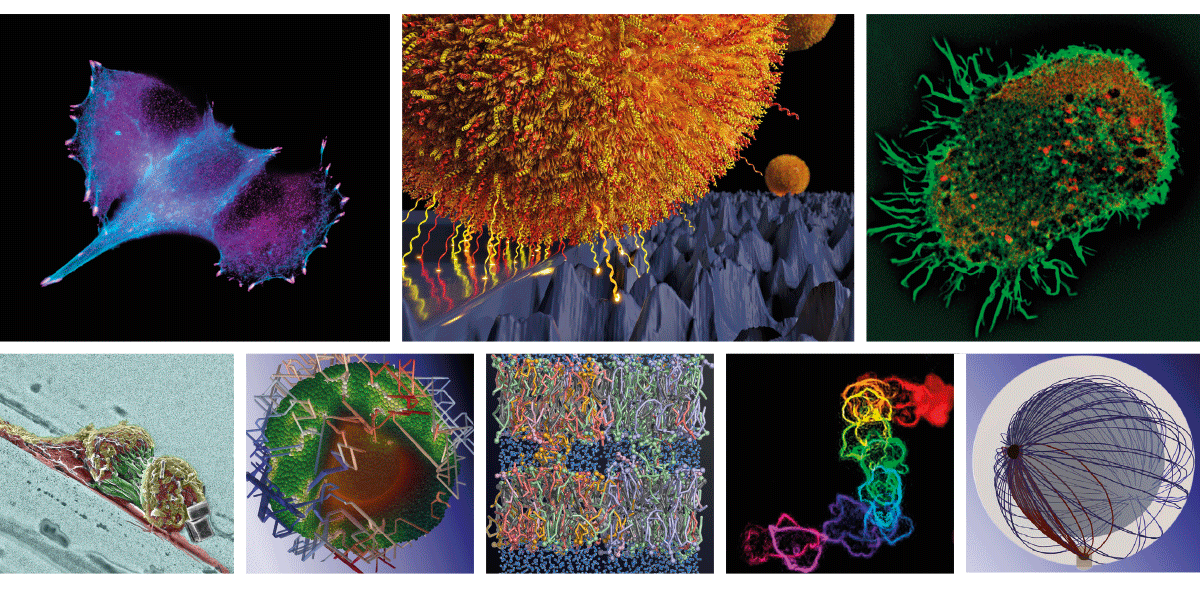Physical modeling of non-equilibrium processes in biological systems

Announcements:
SFB 1027 Seminar
Self-assembly and self-organization in nonreciprocal colloidal systems
Recently much attention has been devoted to colloidal systems that are intrinsically out of equilibrium, a prime example being synthetic “active” colloids, but also colloids with non-reciprocal couplings (generated by a nonequilibrium environment) or colloids under feedback control. In this talk I will mainly address the impact of nonreciprocity, focusing on systems with anisotropic interactions. The first example concerns mixtures of repulsive active particles with non-reciprocal polar alignment, providing a minimal model of a system exhibiting both, clustering and polar ordering. We investigate the collective behavior of these systems using a combination of mean-field-like continuum theory, particle-based simulations of the underlying Langevin equations, and a corresponding fluctuation analysis.
We show that nonreciprocity has profound influence already below the threshold related to spontaneous time dependency of polarization dynamics. In particular, nonreciprocal alignment alone can induce asymmetrical density dynamics, where single-species clusters chase more dilute accumulations of the other species. The second example is a system of passive colloids with field-induced interactions which, in equilibrium, form rigid clusters with extremely long live times. By considering a binary version with asymmetric interactions, we show that nonreciprocity can have an annealing effect, allowing the system to escape kinetic traps yielding thermalization of clusters and even phase separation.
15:00 Coffee Break
15:15 Dr. Zeinab Sadjadi (A3, AG Rieger): Topotactic guidance of migrating cells by obstacle density
15:30 Dr. Yazdan Rashidi (AG Wagner): Red blood cell lingering modulates hematocrit distribution in the microcirculation
Online Link: click here
IRTG Intro Lecture
Relevant forces in biophysical systems
Online Link: click here
SFB 1027 Seminar
Physics in bacterial motility
Bacterial motility provides many intriguing physics questions. The talk will focus on two of them, the interplay of magnetism and motility in magnetotactic bacteria and the patterns formed in dense monolayers of filamentous bacteria, which both study in collaboration with experimentalists.
The first part of the talk will focus on magnetotactic bacteria that swim along field lines of the geomagnetic field with the help of a chain of special organelles called magnetosomes. Combining experiments and modeling, we show that in obstacle channels mimicking sediment habitats, intermediate field strength increase swimming throughput, while high field strengths lead to trapping, whcih can be understood as an active version of a Kramers problem.
The second part of the talk will focus on filamentous cyanobacteria that glide on surfaces. The parameters of individual filaments can be quantified in great detail. Specifically, their self-propulsion force can be determined from buckling experiments. In dense monolayers they form patterns with nematic and polar order that can be analyzed in parallel in experiments and simulations. The simulations allow to vary parameters that cannot be easily varied experimentally and show the important role of direction reversals in these systems.
15:00 Coffee Break
15:15 Navid Khangoli (B4, AG Seemann): t.b.a.
15:30 Felix Maurer (AG Wagner): t.b.a.
Online Link: click here



